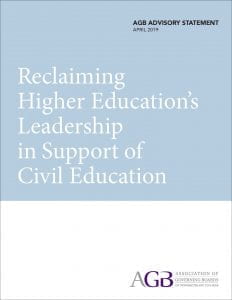
Since the founding of the republic, education has been understood to be integral to the project of American democracy.
Reclaiming Higher Education’s Leadership in Support of Civil Education is a new advisory statement from the Association of Governing Boards of Universities and Colleges (AGB) that urges higher education leaders to recommit to the ideal of promoting democratic values and making direct, pragmatic contributions to the local and national community. A convening in Washington, DC, earlier this year brought together a group of thought leaders—AGB Senior Fellows, college and university presidents, and association leaders—for a robust discussion facilitated by JMU President Jonathan Alger. The report underscores concerns about several trends that affect both the nation and higher education: a lack of civic literacy and growing skepticism about democracy as a system and way of life; racism, xenophophia, and other forms of intolerance threatening the sense of E pluribus unum; growing income inequality that threatens social mobility; heightened distrust in institutions and about evidence and facticity; and serious challenges to civil discourse.
In using the broad term “civil education” the advisory statement seeks to encompass connected issues involving civic education, civil discourse, civic engagement, and the practice of the “democratic arts.” It asserts that institutions of higher learning serve an essential function by educating citizens about democracy, helping students engage productively in the practice of democracy, and in modeling democratic values in their deliberations and interactions with communities: “Higher education can thus help sustain and nourish a healthy democracy by forming engaged citizens who have learned to think broadly about the needs and interests of other people within their communities, states, nation, and, indeed, around the globe.”
According to President Alger, “we can, and should, articulate and emphasize the ‘public good’ aspect of our mission along with the private benefits for individuals associated with job and career placement. AGB’s statement is a recognition of the critical public role that our institutions play in supporting and sustaining our society’s democratic values and structures through the education of engaged citizens from many backgrounds and perspectives.” Underscoring a strong theme of the discussion and the statement, Alger stresses that “civic engagement helps students focus beyond themselves on the circumstances and needs of other people in their communities and society. When students shift their focus in this way they develop understanding, empathy, and a deeper sense of connection to others. President Alger and others who participated in the convening emphasize that students “also develop a sense of agency and purpose as they reflect on how they can use their education and skills to make a difference in addressing important public challenges of our time.”
The AGB civil education statement offers 10 “suggested practices” for governing boards and presidents that, while not prescriptive, point the way to constructive action that can be adapted to campuses large and small, public and private. These include:
- Supporting and empowering faculty in their curricular work that embraces the goal of education for democracy. This includes the linkage between the “core values of general and liberal education and the necessary skills for engaging personally in the practice of democracy” and “high-impact” experiential learning. As many campuses have discovered, service-learning projects, community-based research, internships, and other forms of civic engagement are not only helpful for student learning and persistence in college but are also reinforcers of student well-being. Additionally, research shows a positive impact disproportionately experienced by students from groups historically underserved by higher education.
- Focusing campus conversations and making civil education an institutional priority. Governing boards and presidents—through words of support, attendance at events, and recognition of key participants—can help shape campus cultures in support of civil education. Even more powerfully, they can make the practice of democracy and engagement in civic life a focus of board discussion—and priorities in mission statements, strategic plans, and campus policies.
- Auditing current practices. If, in fact, campuses agree that students should know something about how government works and should be engaged citizens, outcomes should be assessed. And leaders should ask which institutional practices make a difference for learners in this regard. Results of such audits shared with the board can inform strategic planning and future activities.
- Modeling civil discourse and debate. At a time when the vitriolic espousing of opinions often substitutes for trying to understand different points of view and many choose to block out or shout down opposing viewpoints, presidents and boards can advance the practice of democracy by modeling those processes themselves. Boards can ensure that all participants in discussions, deliberations, and decision making in board meetings show respect for each other, practice careful listening and reasoned debate, and operate in a spirit of collaboration and openness. Board members who speak out publicly on civic issues—and support their president and faculty as public voices advocating for civil education—similarly reinforce the values of democracy.
Read more here.

Recent Comments